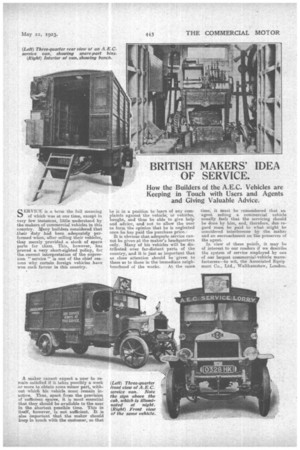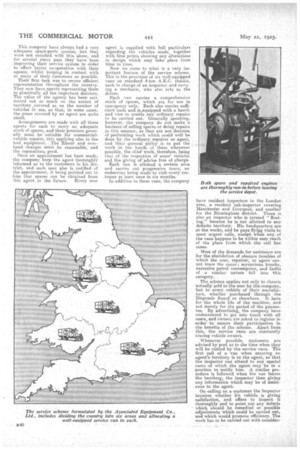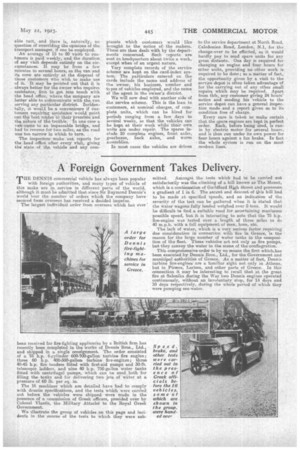BRITISH MAKERS' IDEA OF SERVICE.
Page 25

Page 26

Page 27

If you've noticed an error in this article please click here to report it so we can fix it.
How the Builders of the A.E.C. Vehicles are Keeping in Touch with Users and Agents and Giving Valuable Advice.
SERVICE is a term, the full meaning of which was at one time, except in very few instances, little understood by the makers of commercial vehicles in this country. Nany builders considered that ,their duty had been adequately performed when, after selling their vehicles, they merely provided a stook of spare parts for them. This, however, has proved a very short-sighted policy, for_ . the correct interpretation of the expression " service " is one of the chief reasons why certain foreign vehicles have won such favour in this country.
he is in a position to learn of any complaints against, the vehicle, or vehicles, bought, and thus be able to give help and advice, and not to allow the user to form the opinion that he is neglected once he has paid the purchase price. It is obvious that adequate service cannot be given at the maker's headquarters only. Many of his vehicles will be distributed over far-distant parts of the country, and it is just as important that as close attention should be given to these as to those in the immediate neighbourhood of the works. At the same time; it must be remembered that an agent selling a commercial vehicle usually feels that the servicing should be done by him, and, therefore, due regard must he paid to what might he considered interference by the maker and an encroachment on the preserves of the agent.
In view of these points, it may be of interest to our readers if we describe the system of service employed by one of our largest commercial-vehicle ma.n.tr: fact arers—to wit, the Associated Equip melt Co., Ltd., 1Valthamstow, London.
This company have always had a very adequate spare-parts system, but, they were not satisfied with this alone, and for several years past they have been improving their service system in order to effect better co-operation with their agents, whilst keeping in contact With as many of their customers as possible. Their first task was to secure efficient representation throughout the country. • They now have agents representing them in practically all the important districts. The value of the agency has been estimated riot so mach on the extent of territory ,covered as on the number Of vehicles in use, so that, in some eases, the areas covered by an agent are quite. small.
Arrangements are made with all these agents for each to carry an adequate stock of spares, and their premises generally must be -suitable for commercialvehicle repairs, this applying also to the tool equipment. Ile llbour and overhead • charges must be reasonable; and the reputations, good.
Once an appointment has been made, the company keep the agent thoroughly informed as to the customers in his district, andeach user also is .notified of the appointment, it being pointed out to
• him that spares can be obtained from this agent in the future. Every new agent is supplied with full particulars regarding the vehicles made, together with blue prints showing any alterations in design which may take place from time to time.
Now we come to whatis a very important feature of the service scheme. This is the provision of six well-equipped vans on standard 4-ton A.E.C, chassis, each in charge of an inspector and carrying; a mechanic, who also acts as the timer.
Each van carries a comprehensive stock of spares, which are for use in emergency only. Each also carries sufficient tools and is ,equipped with a bench and vice to enable any ordinary repairs to be 'carried out. Generally speaking, however, the company do not make a business of selling spares or doing repairs in this manner, as they are not desirous of performing work which could well be done by the ordinary repairer or agent, and their general policy is to put the work in the hands of these whenever possible, the chief work, therefore, being that of the inspection of users' vehicles and the giving of-advice free of charge. Each van is allotted a certain area and carries out progressive tours, an endeavour being machyto visit every customer at least once in six months.
• In addition to these vans, the company have resident inspectors in the London area, a resident sub-inspector covering Manchester and Liverpool, and another for the Birmingham district. There is also an inspector who is termed " floating," because he is not allotted to any definite territory. His headquarters are at the works, and he pays flyiigg visits to meet urgent calls, 'except when any of the vans happens to be within easy reach of the place from which the call has come.
Most of the demands for assistance are for the elucidation of obscure troubles of which the user, repairer," or ngent'ean. not trace the cause ; mysterious knocks, excessive petrol consumption, and faults of a similar nature fall into this category.
The scheme applies not only to chassis actually sold to the user by the company, but to every vehicle of their manufacture, whether purchased through the Disposals Board or elsewhere. It lasts for the whole life of the machine, and not merely for tho period of the guarantee. By advertising, the company have endeavoured to get into touch with all users, and owners are asked to register in order to ensure their participation in the benefits of the scheme. Apart from this, the service vans are constantly
tracing vehicle owners. •
Whenever possible, customers are advised by post as to the time when they will be visited by the service vans. The first call of a van when entering an agent's territory is to the agent, so that the inspector -can attend to any special cases of which the agent may be in a position to -notify him. A similar procedure is followed when the van leaves the territorx, the inspector then giving any information which may be of assistance to the agent;
On calling on a customer the inspector inquires whether his vehicle is giving satisfaction, and offers to inspect it thoroughly and to point out any defects • which should be remedied or ,-possible adjustments which could be carried out, and which would promote efficiency. The work has to be carried out with consider able tact, and there is, naturally, no question of overriding the opinions of the transport manager, if one be employed.
An average of 15 to 20 visits to customers is paid weekly, and the duration of any visit depends entirely on the.circumstances. It may be from a few minutes to several hours, as ihe van and its .crew are entirely at the disposal of those customers who wish to make use of it. It may be pointed out that it is always better for the owner who requites assistance, first to get into touch with the head office, where the company are better able to conimunic,ate with the van serving any particular district. Incidentally, it would be a convenience if Customers requiring assistance would point ant, the best rontes.th their premiss and the nature of the trotible. In one case a 'YAW-came to an impassable bridge, and had to reverse lot two miles, as the road
was too narrow in whie.h to turn. . The inspectors' make out. reports for the head •office. after every visit, giving the ,state of the vehicle and any corn plaints which customers would like brought to the notice of the makers. These are then dealt with by the departments concerned_ Such reports are sent to headquarters about twice a week, except when of an urgent. nature.
Very complete records of the service scheme are kept on the card-index system. The particulars entered on the cards include the name and address of the owner, his business, rannber and types of vehicles employed, and the roma of the agent in the owner's district.
We will now deal with anOther side of the service scheme. This is the loan to customers, at nominal charges, of .complete units, which can be hired for periods ranging from a few days to several weeks, so that the vehicles can be kept at their work while their own units are under. repair. The spares include 10 complete engines, front axles, gearboxes, back axles, and worm assemblies.
In most cases the vehicles are driven
to the service department at North Road, Caledonian Read, London, Ni., for the change-over to be effected, as it. would hardly pay to send spare units for any great distance. One day is required for changing an engine and four hours for other units, providing no other work is required to be done; as a matter of fact, the opportunity given by a visit to •the service depot is often taken advantage of for the carrying out of any other small repairs which may be required. Apart, from this, any customer giving 24 hours' notice and sending his vehicle to the service depot can have a general inspeeCon made and a report given as to its condition free of charge.
• Every care is taken to make certain that the spare engines are kept in perfect order. Each, before being used, is runin by electric motor for several hours, and is then run under its own power for four hours against a fan brake. In fact the whole system is run on the most modern lines.


































